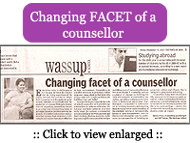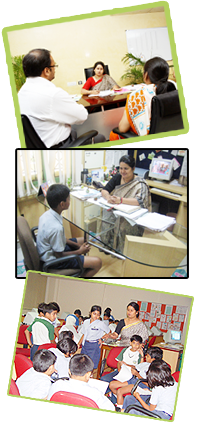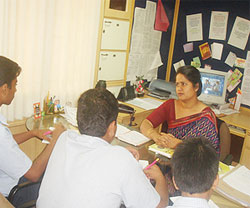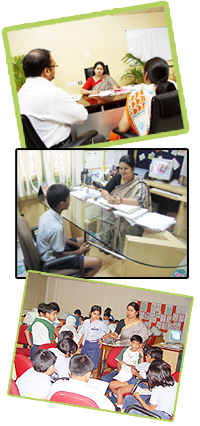
QUOTATION
"At times I envy the band aid man
Who cleaned my cuts when I was young
While painting me as mercurochrome clown
Before he patched my pain with adhesive
That was security to know he cared and would be around
To fix when possible all the hurts of childhood
That come in growing to be man
His job, I think was easier than mine
For in counseling I cannot always see
Your past wounds scars and might have been
If I could on days like today
I might like the old man I remember
Try with gentleness to cover them
For you sit beside me with tears in your eyes
And I know how slowly it takes words to heat."
From “The Bandaid man,” by S.T. Gladding, 1975 Personnel and Guidance Journal by
ACA
|

I have been very eclectic in my approach and used the approaches that would empower
and enable people to find solutions to their concerns. However over the years it’s
the Rogerian school of thought that has affected me the most and some fundamentals
that I have internalized about human nature are best described by Carl Rogers as
– View of Human Nature Implicit in person centered counseling is a particular view
of human nature : people are essentially good ( Rogers 19610.) Humans are characteristically
positive forward moving constructive realistic and trustworthy Each person is aware
inner directed and moving toward self actualization from infancy on Rogers held
that human infants possess the following traits:-
- Whatever n infant perceives is that infant’s reality.
- An infant’s perception is an internal process that no one else can be aware of.
- All infants are born with a self actualizing tendency that is satisfied through
goal directed behavior.
- An infant’s interaction with the environment is an organized whole and everything
an infant does is interrelated.
- The experiences of an infant may be seen as positive or negative according to whether
the experiences enhance the actualization tendency.
- Infants maintain experiences that are actualizing tendency.
- Infants maintain experiences that are actualizing and avoid those that are not.
+ Read More
|

|
According to Roger’s self actualization is the most prevalent and motivating drive of existence and encompasses actions that influence the total person. Person centered theories believe that each person is capable of finding a personal meaning and purpose in life. This is what I have always believed and used to counsel people in distress particularly the young adults. Some other counseling approaches that are very useful and used widely.
COGNITIVE BEHAVIORAL COUNSELING - Some predispositions for behavioral counseling
- Behaviorists assume that all behavior is learned whether it be adaptive or maladaptive
- Behaviorists believe that learning can be effective in changing maladaptive behavior
- Behaviorists focus on setting up well defined therapy goals with their clients.
- Behaviorist reject the idea that the human personality is composed of traits.
- Behaviorist stress the importance of obtaining empirical evidence and scientific
support for any techniques they use.
PERSON CENTERED COUNSELING is the most widely used affective approach followed and some basic characteristics of this school of counseling are :-
- They focus on the primacy of affect as a cause of or contributor to the development of certain human actions and reactions ( Zajonc, 19840.)
- Second they stress helping clients cope with or change their emotions as premise for making other life alterations.
- Third they emphasize on how a person’s views of the environment affect behavior.
- Fourth they are characterized by a person to person relationship between counselor and client.
- Finally they are humanistic in orientation focusing on the unique growth and development
within each individual.
The major objective of the counseling is to bring about a voluntary change in the
counselee. For this purpose the counselor’s ideas facilitates counselee to achieve
the desired change or make the suitable choice. In counseling the tool is communication,
listening and understanding.
|

|
|

Counseling is often known as counseling psychology wherein the counselor offers suggestions that are not meant to cure the mental problems in a person. These are
constructive suggestions which are suggested by the counselor after understanding the problem or basic situation.
The duty of a counselor is to highlight the positive
strokes in a person and enable the coping skills to deal with the current situation. These could be daily ongoings like coping with stress, marriage counseling, behavioral
symptoms and child therapy relating to education, career choice and management. Counselors practicing counseling psychology are different from psychiatrists who
deal with treating problems associated with diagnosed mental health.
The process of counseling is firstly based on initiative to over come the problem. This is already
considered as the first step when we approach a counselor. Then is the identification stage to understand the stage of the issue. Suggestions, talks, exercises and sessions
slowly alleviate the problem by understanding the core psychological issue along with it. There are various streams like education counseling, anger counseling and
also grief therapy. Accepting the problem and evaluating the probable solution is a good exercise.
For start ups, working on the models of a standard procedure seems
acceptable by the client. Then there is an opening stage where the client suggests
certain skills. Many times group therapy opens up creative skills whereby the clients
feel elated when their suggestion actually works. Application of these solutions
with an out-of-box attitude is very important to break the conservative mould.
What Counseling is not:
Counseling is not giving information, though information may
be given. Counseling is not giving advice , making suggestions and recommendations.
Counseling is not influencing the client’s values, attitudes, beliefs, interests,
decisions, etc. with or without any threat or admonition. Counseling is not for
mentally sick people.
|

Today in progressive schooling set
ups, the role of a counsellor has changed drastically and it has evolved as a dynamic
multifaceted support system. School counselors are key members of guidance and
student services teams. Within the context of a collaborative, interdisciplinary
team approach, school counselors play a leadership role in the development and implementation
of a comprehensive guidance and counseling program.
 School Counsellor’s Roles and Functions :-
School Counsellor’s Roles and Functions :-
- Development Guidance: As a Counsellor I develop, co-ordinate, and implement various
developmental and preventive Program.Life skills program at Heritage that caters
to students of 8years to 18 years age group.
- Individual Planning: As a Counsellor I participate, collaborate and consult as
members of the interdisciplinary team to provide support for students' individual
performance academic as well as behavioral.
- Responsive Services: As a Counsellor I provide services to students in need through
individual and small group guidance and counseling interventions, crisis intervention,
parent out-reach, consultation, referral, and multi-systemic interventions.
- Systems Support: As a Counsellor I perform various activities intended to support
the school's guidance function. Examples include conducting workshops for parents
and staff, student placement, research, data collection, community outreach, and
program administration.
Counsellors are also in a key position to play a vital advocacy role for students with staff, families, and outside agencies.
Working in a counseling Relationship in schools:
Counseling requires constant sensitivity
to the status of the relationship and the client’s ( in our case it is the student
) developmental nature. The counselor must be alert to new needs and demands as
they develop.
 Child counseling can be a classification of several problems. Solutions are possible for a seeker but in many cases parents need to be open about the problem and hence
the approach can lead to solving the issue at the root cause. Most childhood problems are related to behavioral symptoms but mostly patterns also tend to worry about
children achieving milestones. A case of dyslexic children or slow learners is a special one where the mode of process counseling is gentle and more focus is given
on parents. The therapies associated with child counseling need to be appreciated by parents who are the main role models for a child. Children are subject to physical
and mental abuse by many people and here it is important to have a strong conviction to get back to normalcy. A healthy environment is necessary for the child to reinforce
his belief in live and grow in a normal manner.
Child counseling can be a classification of several problems. Solutions are possible for a seeker but in many cases parents need to be open about the problem and hence
the approach can lead to solving the issue at the root cause. Most childhood problems are related to behavioral symptoms but mostly patterns also tend to worry about
children achieving milestones. A case of dyslexic children or slow learners is a special one where the mode of process counseling is gentle and more focus is given
on parents. The therapies associated with child counseling need to be appreciated by parents who are the main role models for a child. Children are subject to physical
and mental abuse by many people and here it is important to have a strong conviction to get back to normalcy. A healthy environment is necessary for the child to reinforce
his belief in live and grow in a normal manner.
Education counseling for children is a constant process where the counselor at the
school associates certain patterns and evaluates the child on his or her progress.
This is important to detect certain qualities that enable a child to focus on an
aspect he is good at and also overcome certain learning disabilities. Parents and
teachers can complement in the progress of the child.
Abuse counseling or certain addictions in children are more of a psychological impact.
The counselor gives sessions and usually children are adaptive to overcoming their
demerits with distractions. Generating focus and also abling them with certain hobbies
is the best remedy given by the counselor. Children with terminal illness also require
counseling therapy to cope up with the treatment and develop their willpower.
Children noted with ADHD or hyperactive disorder can also be introduced to a counselor
who will also guide the parents or caregiver according to lessen or channelize the
excess energy effectively.
|

Psychology is the study of people: How they think, How they act, react and interact. Psychology is concerned with all aspects of behaviour and the thoughts feelings
and motivations underlying such behaviour. Reaction to being introduced as a psychologist is 'well can you tell what I'm thinking then?' We are all interested in what makes people tick, but beyond this in reality this understanding can help us to solve
major problems in society. While studying psychology one has to learn scientific methods of observing, measuring, testing, using statistics to show that what you
find is reliable evidence and not just by chance.
Work of a psychologists does not simply collect evidence to explain people's behaviour; rather they use their understanding to help people with difficulties and bring about
change for the better. For example, as a counseling psychologists I have been concerned with problems such as:
- How to build confidence in a child?
- How should people act so others tend to find them attractive or confident?
- How can we keep our anger in check on the field or while driving?
- How can we help people overcome depression, stress or phobias?
- How can schoolgoing children counter strong bullying?
- How can teachers or lecturers ensure students are really learning?
- How can we ease the effect of parental divorce on children?
- How should children be introduced to talk about sexuality?
- How can we minimise peer pressure by building positive classroom environment?
I have been employing psychology for working collaboratively with people across a diverse range of human problems. These include helping people manage difficult
life events such as bereavement, past and present relationships and working with
mental health issues and disorders. As a Psychologists I accept subjective experience
as valid for each person, explore underlying issues and use an active collaborative
relationship to empower people to consider change. Educators, students and parents
all bridge gaps of communication, perception and understanding with a psychologist’s
intervention that leads to healthier relations and emotional well being.
|

It is a matter of common observation that growing persons often encounter problems
in their progress towards maturity. They often need help in learning to meet the
demands of academics and society,of adjustment to the changing circumstances, to
other people and above all to themselves. In this process, some may need occasional
help, while others need continuous help; and some may need relatively less help
while others may need more help. Counseling consists of essentially the help given
to such people to help themselves become self-sufficient, self-dependent and self-directed
persons to adjust themselves efficiently to the demands for an effective, better
and meaningful life. While it is true that many young people in trouble often need
counseling, several others also need it under different circumstances in order
to make better adjustments to different situations in life.
Counseling involves two individuals one seeking help and the other a professionally
trained person who can help the other one.There should be a relationship of mutual
respect between the two individuals. The counselor should be friendly and co-operative
and the counselee should have trust and confidence in the counselor.
Counseling helps the counselee acquire independence and develop a sense of responsibility.
It helps the counselee explore and fully utilize his/her potentials. Counselor as
teacher and model focuses on establishing a relationship with counselee that assists
individuals to become psychologically strong and responsible. The goals of person
centered counseling concern the client as a person not his or her problem.
|

|
Counseling assisstance
Counselor as teacher, a guide and expert assists counselee in following ways :-
In clarifying goals
Modifying behaviors and thoughts
Helps clients make good adjustment,
Modify maladaptive behavior by learning productive responses
Establish and achieve specific concrete goals and sub goals
Change thoughts
Formulate a realistic plan
Rationally stress elimination
Counseling involves something more than the solution of an immediate problem; and
it deals with individual’s attitude as well as actions.
|
Counseling Adolescents:
Adolescence is a period when rapid changes occur in the physical and psychological
development of an individual. It is considered as a period of storm and stress.
During this period adolescents experience a confusion regarding the roles he/she
is expected to play. At this stage adolescents need proper care, understanding and
counseling from adults. Group counseling may be more appropriate and feasible for
adolescents. Individual counseling can be done in specific situations where it is
required. Group counseling may co sometimes be successful with adolescents who have
not responded well to individual counseling attempts. The interaction which takes
place in group counseling offers the adolescent a means of gaining insight into
and understanding of his/her own problems through listening to others, discussing
similar difficulties. Solution given for a particular person’s problem may be applicable
to others also.

The basic aim of adolescent counseling is to help the adolescent to resolve problems
in future. This can be achieved by:
Helping the adolescent to get adjustment
Helping them to develop rational decisions
Helping to develop constructive pursuits
Making them aware about the community sources for immediate solutions
Helping to correct situational difficulties
Helping them to increase their personal skills and group skills
Helping them to develop a desirable value system
|
Tips on counseling adolescents:
Be open: Adolescents should be made to feel that nay question can be asked.
Without nay hesitancy: no question is wrong or stupid. Be flexible. Discuss with
the adolescents the issues they want to talk about. Give simple, direct answers
in plain words.
Be trustworthy: The clients should be able to trust you. Whatever information
you give should be accurate and client should be able to believe it. Stress confidentiality
Be approachable. Show respect. Be understanding.
Qualities of good counselor:
Develop a good rapport with the client.
Develop good listening skills.
Observe the counselee’s action.
A strong self-esteem should be developed by the counselor.
Confidentiality in counseling is very important.
Genuine concern for the clients.
Counseling is required for:
Those who have adjustment difficulties.
Those with scholastic backwardness.
Those with character and personality disorders.
Those with specific behavioral problems.
Non - assertive adolescents.
Outcomes of counseling
As a result of person centered counseling person should become:
More realistic in their self perceptions.
More confident and self directing.
More positively value themselves,
Less likely to repress aspects of their experiences,
More mature socialized and adaptive in their behavior
Less upset by stress and quicker to recover from it and
More like the healthy integrated well functioning person.
Furthermore a fully functioning person develops a greater acceptance of self and
others and becomes a better decision maker in the her and now.
|
|
|